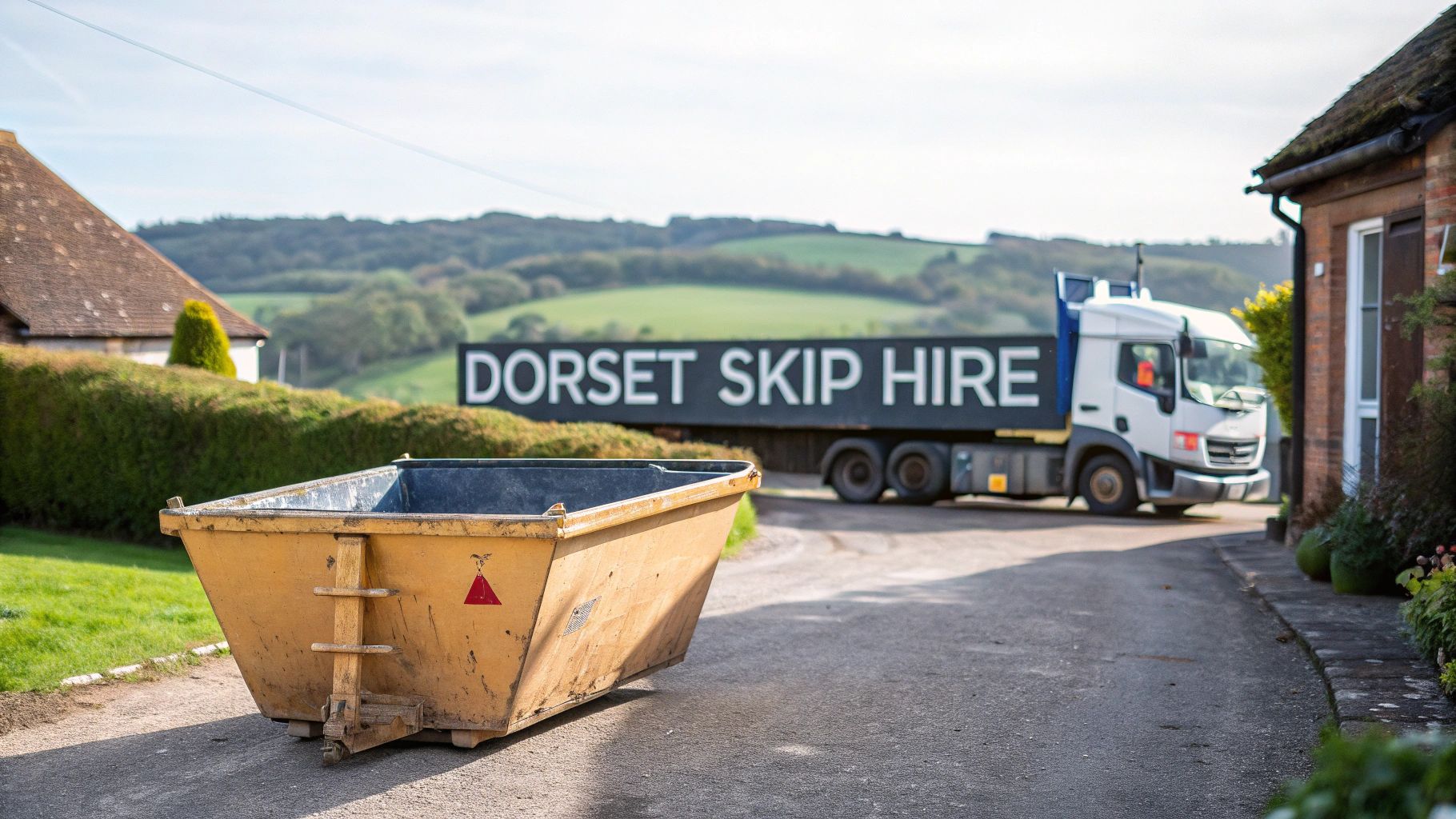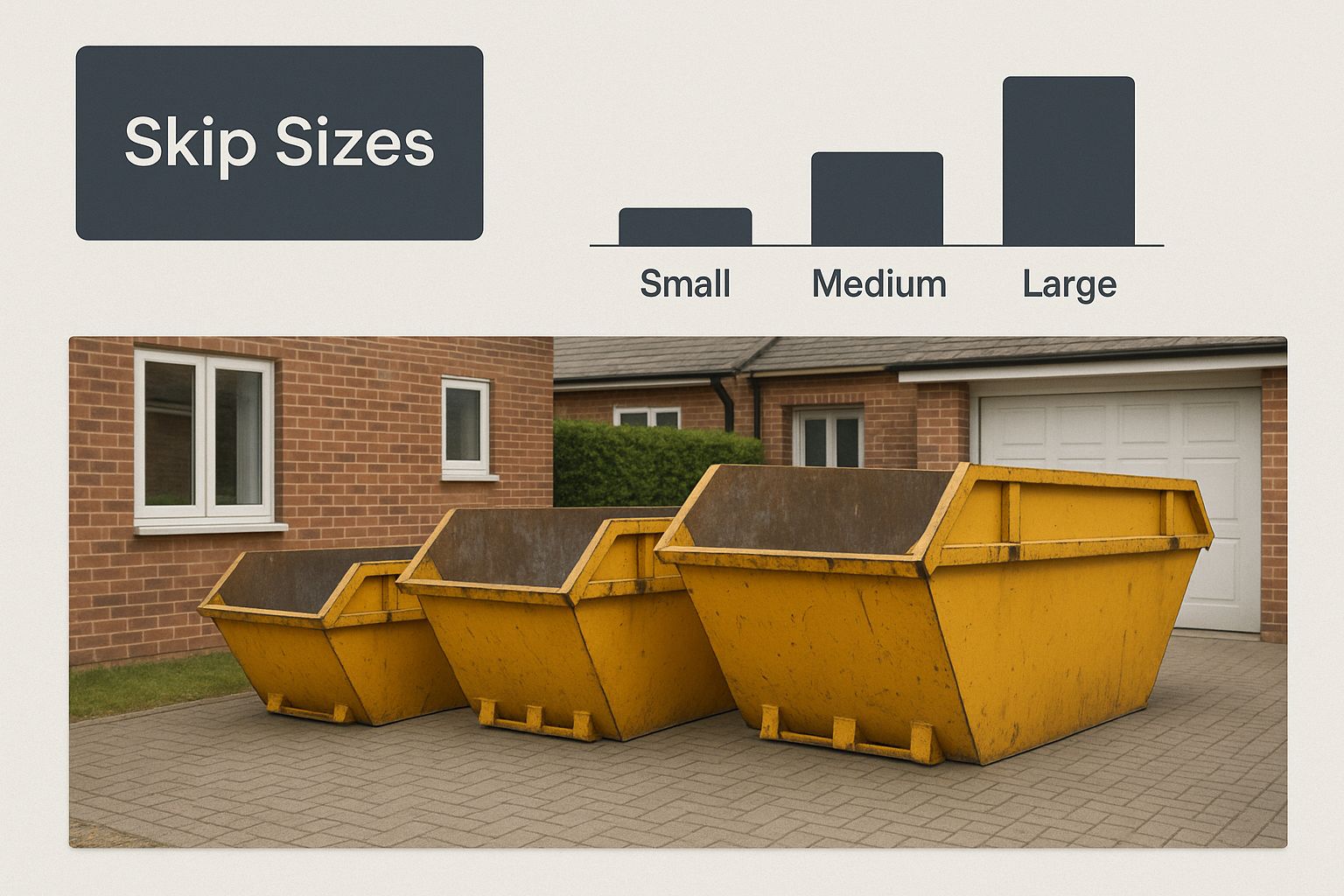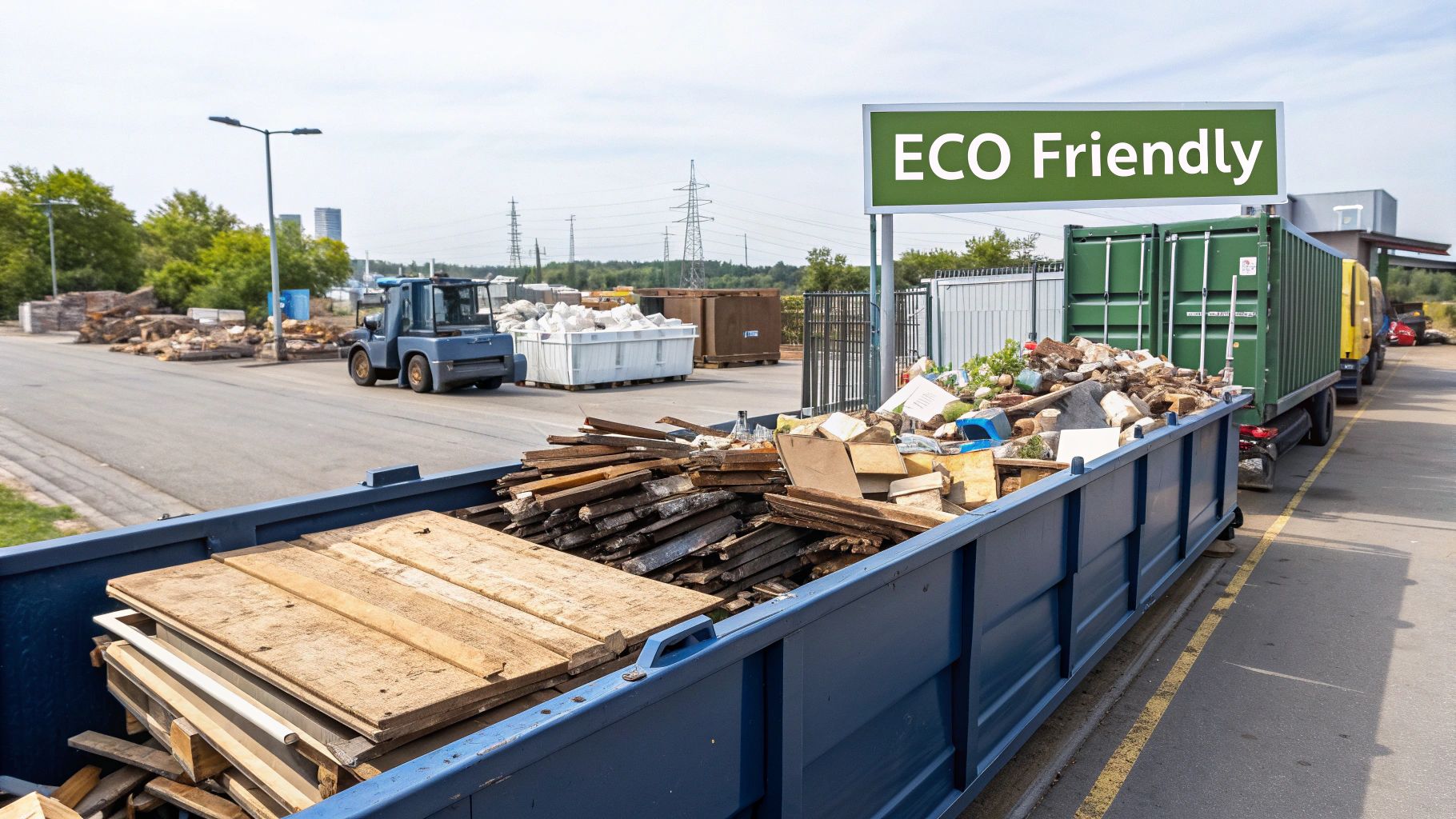Dorset Skip Hire | Fast and Reliable Waste Disposal

Dorset Skip Hire | Fast and Reliable Waste Disposal
Hiring a skip in Dorset is a pretty straightforward way to get rid of rubbish from all sorts of jobs, from a garden clearance in Weymouth to a full-on renovation in Bournemouth. It all boils down to picking the right size skip, getting your head around the costs, and booking a delivery with a local company. Honestly, it's the easiest method for dealing with a big pile of waste properly.
Making Sense of Dorset Skip Hire
Deciding you need a skip is the simple bit. Working out the details? That can feel a little more daunting. The aim is always to find a skip that’s just right for your job, without paying for space you don't need. A bit of prep work now will save you a world of headaches later on.
First things first, you need a realistic look at what you're throwing out. Are we talking about a single room clear-out, or is this a major building project? The answer to that question will tell you exactly what size skip you need. The classic mistake is underestimating just how much stuff you’ll end up with, which often means having to hire a second skip – and nobody wants that extra cost.
Key Factors to Consider
To nail it the first time, you really only need to think about three things:
- Type of Waste: General household junk and garden clippings are easy. Heavier stuff like soil, rubble, and concrete needs a much tougher skip and can cost more because of the weight.
- Project Scale: A small bathroom rip-out won't create nearly as much rubbish as a kitchen renovation. Likewise, bigger landscaping jobs, like building retaining walls, can produce a surprising amount of waste that needs to be cleared away efficiently.
- Site Access: Can a big lorry actually get to your property? You need to think about tight lanes, gates, or low-hanging trees. If the skip won't fit on your drive or garden, you'll need a permit to put it on the road.
Thinking about these points takes all the guesswork out of it. This quick check makes sure you're ready to find the best dorset skip hire for your needs.
Taking a moment to properly size up your waste and check the access is the secret to a smooth, affordable, and completely stress-free skip hire, from drop-off to pick-up.
Having this information ready helps you have a much clearer conversation with the skip hire company. Instead of just asking for a "medium skip," you can confidently say you need to get rid of mixed heavy waste from a small extension and that access might be a bit tricky. That kind of clarity helps them give you a spot-on quote and send the right lorry and skip, getting your project off to the perfect start.
Choosing the Right Skip Size for Your Project
Getting the skip size right is probably the single most important decision you'll make when hiring one. It's the difference between a smooth-running project and the headache of realising you've run out of space halfway through.
It’s easy to underestimate just how much waste a simple clear-out can generate. A pile of stuff in the corner of a room suddenly looks a lot bigger when it's taking up your entire driveway. That's why understanding what terms like 'cubic yards' actually mean in the real world is so crucial for your Dorset skip hire.
This visual guide is a great starting point for seeing how the common skip sizes stack up against each other.

As you can see, the jump between each size is pretty substantial, which really brings home why it pays to get it right the first time.
Matching Skips to Common Dorset Projects
Let’s put this into practice. Say you’re renovating a small bathroom in your Dorchester home. You’ll have the old toilet, sink, bath, and a load of tiles and flooring to get rid of. For a job like this, a 4-yard ‘midi’ skip is almost always the perfect choice. It’s small enough to fit on most drives but has plenty of room for all that debris.
Now, imagine a bigger project—a full garden clearance in Poole. You’re ripping out turf, digging up soil, and tearing down an old shed. That’s a mix of really heavy stuff and bulky, awkward items. Here, an 8-yard ‘builder's skip’ is what you need. It’s the industry favourite for a reason, offering ample space for everything from soil and rubble to timber panels.
A simple rule of thumb: if you find yourself hesitating between two sizes, it is almost always more cost-effective to opt for the larger one. The price difference is minimal compared to the expense of a second hire.
For an even more in-depth look at matching your waste to the right container, our guide on what size skip you need has plenty more real-world examples.
A Quick Guide to Skip Sizes and Uses
To make it even simpler, here’s a quick reference table that ties skip sizes directly to common projects we see across Dorset every day.
Dorset Skip Size Guide and Common Uses
| Skip Size (Cubic Yards) | Approximate Bin Bags | Ideal For Projects Like |
|---|---|---|
| 4 Yard 'Midi' | 30-40 | Small kitchen/bathroom refits, garden tidy-ups |
| 6 Yard 'Small Builder's' | 50-60 | Bulky waste from loft/garage clearances, minor renovations |
| 8 Yard 'Large Builder's' | 70-80 | Major home renovations, construction jobs, full house clearances |
This table should give you a solid idea of where to start, helping you find the perfect fit for your job without overspending or underestimating.
Visualising Skip Capacity in Bin Bags
Still struggling to picture it? Let's try thinking in terms of something we all handle regularly: standard black bin bags.
- A 4-Yard Midi Skip holds roughly 30-40 bin bags. This makes it ideal for those smaller refits or a really thorough garden clear-out.
- The 6-Yard Small Builder's Skip fits around 50-60 bin bags. It’s a brilliant, versatile choice for getting rid of bulky waste from a loft clearance or a small home renovation.
- Our most popular size, the 8-Yard Large Builder's Skip, takes approximately 70-80 bin bags. This is the go-to for big renovation projects and hefty amounts of construction waste.
Just remember, these numbers are a guide. Bulky items like old furniture or long pieces of timber won't pack down as neatly as bags. Always think about the type of waste you have, not just the volume, to make sure you get the most out of your hire.
Getting to Grips with Skip Hire Costs and Permits in Dorset
So, how much is it actually going to cost to hire a skip in Dorset? The answer isn't just one simple number. The final price tag is a mix of a few key things, and understanding them from the start means you won't get any nasty surprises.
Obviously, the size of the skip is the biggest factor—a bigger skip means a bigger bill. But you also need to think about how long you'll need it. Most companies offer a standard hire period, usually a week or two, but if your project drags on, you'll likely face extra weekly charges.
Where you are in Dorset matters, too. A delivery to a remote village will cost more in fuel and time than one just down the road from the depot. And don't forget the waste itself! Heavy stuff like soil, bricks, and rubble is far more expensive to dispose of than lighter, general household rubbish. If you’re planning a big job like a bathroom renovation, these disposal costs are a crucial part of your budget. A good bathroom shower remodel cost guide can help you plan for every expense.
The Hidden Cost: Landfill Tax
One of the biggest chunks of your skip hire fee is something you never see: Landfill Tax. This is a government tax on waste that ends up in the ground, and it's been climbing steadily.
Since 2019, the standard rate has shot up, which has had a direct knock-on effect on what we all pay for waste disposal. It’s a major reason why skip hire seems more expensive than it used to be.
Do I Need a Skip Permit from Dorset Council?
This is a big one. Got a private driveway or a patch of land to pop the skip on? Great, you don't need to worry. But if that skip has to go on any piece of public land – the road, a pavement, or even the grass verge outside your house – then you absolutely must have a skip permit from Dorset Council.
Your skip hire company will almost always sort this out for you, and for good reason. It’s a legal requirement.
Key Takeaway: Don't be tempted to stick a skip on the road without a permit. The fines are steep, and you'll be told to get it moved immediately. It’s just not worth the risk.
Getting a permit isn't an overnight thing, either. You’ll need to allow at least 3-5 working days for the council to process the application, so plan ahead. This permit is an extra cost on top of the hire fee, so make sure you factor it into your budget. To get a better feel for how local factors can add up, check out our deep dive into skip hire prices in Dorset.
There’s a reason the professionals handle this. They have to prove to the council that they have the right level of public liability insurance. They’re also responsible for making sure the skip is placed safely and has all the proper safety gear, like reflective markings and traffic cones, to keep everyone safe.
What Can and Cannot Go in Your Skip

Knowing exactly what you can and can't toss in a skip is probably the most critical part of hiring one. Honestly, getting this bit wrong is where most problems start, leading to anything from a refused collection to some nasty extra charges.
It’s best to think of a skip as a specialist tool. It’s brilliant for most general waste, but it’s definitely not a free-for-all bin.
The rules aren’t there just to be awkward; they’re in place for serious safety and environmental reasons. Once we collect your skip in Dorset, it heads straight to a licensed waste transfer station to be sorted. If hazardous materials get mixed in, they can contaminate the entire load. This not only makes recycling impossible but also poses a real risk to the people handling it.
Green-Lighted Materials You Can Freely Dispose Of
Good news first. Skips are absolutely perfect for the vast majority of waste you’ll generate from household clear-outs, garden makeovers, or DIY projects. You can confidently fill your skip with all sorts of common materials, which is what makes them so handy.
You’re generally good to go with:
- Household Junk: Think old furniture, knackered toys, carpets, and all that general clutter you find lurking in the garage.
- Garden Waste: Soil, grass cuttings, leaves, branches, and old bits of turf are all fine.
- Building Debris: Bricks, rubble, concrete, bits of metal, and old tiles can all go in.
- Untreated Wood: This includes things like floorboards, timber offcuts, and old fence panels.
This list covers most of what people need to get rid of. Loading these materials properly helps the team back at the depot sort everything efficiently, meaning we can recycle as much as possible.
Red-Lighted Items Strictly Prohibited from Skips
Right, this is the crucial part. There are certain items that must never be put into your skip. I can't stress this enough. Adding prohibited waste can lead to hefty extra fees, or worse, the driver may have to refuse the collection entirely.
This is all because these items are classed as hazardous and need specialist disposal.
The core reason for these restrictions is safety and compliance. Hazardous waste must follow a specific, documented disposal route to protect both people and the environment from harm.
Under no circumstances can you put these items in a skip:
- Plasterboard: It contains gypsum, which can create a toxic gas when it mixes with other waste. It has to be handled separately.
- Asbestos: A highly dangerous material that needs specialist removal and disposal. Never, ever put this in a skip.
- Electricals (WEEE): Basically, anything with a plug or batteries. We’re talking TVs, fridges, microwaves, and old computers.
- Batteries: Whether from a car or your TV remote, they can leak nasty chemicals.
- Tyres: These are a real headache to process and have their own dedicated recycling stream.
- Gas Cylinders: Even if you think they’re empty, these pressurised containers are a serious explosion risk.
- Hazardous Liquids: This covers a lot, including paint, solvents, oil, and other chemicals.
Keeping these items out of your skip is the key to a smooth Dorset skip hire. For a really detailed breakdown, our guide on what can go in a skip has all the information you need to avoid any costly mistakes.
How to Prepare for Skip Delivery and Collection
Getting the logistics of your skip delivery and collection right is the key to a stress-free project. A bit of forward planning makes a world of difference, saving you from potential headaches, extra fees, and unnecessary delays.
The skip will turn up on a fairly hefty lorry, and these things need a surprising amount of space to get in and out safely. Before your delivery day, it’s well worth having a walk around your property to scout for any potential snags. The driver needs a completely clear run to your chosen drop-off spot.
Ensuring Clear Access for the Lorry
Think about the lorry's entire path, from the moment it leaves the main road to its final destination on your drive. Are there any tight gateways, tricky corners, or narrow parts of your lane that might cause an issue? As a rule of thumb, the vehicle needs a clear width of about three metres to get through without a scratch.
Don't forget to look up! Low-hanging tree branches or sagging telephone lines are common culprits that can stop a delivery lorry in its tracks. A quick trim of any overhanging branches a few days before can prevent a lot of hassle. It’s also a good idea to have a friendly chat with your neighbours about moving any cars that might block access on the day.
A failed delivery attempt because the lorry can’t get in often means you’ll be charged a wasted journey fee. Taking ten minutes to clear the way is a tiny bit of effort that ensures your Dorset skip hire gets off to a perfect start.
The Best Placement for Your Skip
So, the lorry has arrived. Where’s the best place for the skip to live? Ideally, you want it on private property, on solid, level ground. A driveway is perfect, or a patch of garden you don't mind sacrificing for a week or so. Putting it on a hard surface is crucial to stop it from sinking into the lawn, especially after one of our classic Dorset downpours.
Think practically about how you'll be loading it. You want the skip as close as possible to where the waste is coming from—it'll save you a lot of back-breaking trips. If you’re gutting the house, a spot near the front door makes sense. For a big garden clear-out, placing it right by the lawn is a no-brainer.
Finally, consider simple safety and convenience. Make sure the skip won't block access to your garage, obstruct your front door, or jut out onto a public footpath. The goal is to find a spot that works for you without becoming a hazard or a nuisance for anyone else. A bit of thought at this stage makes the whole job run smoothly.
Why Your Choice of Skip Company Matters

When you hire a skip, you’re not just renting a big metal box. You're handing over responsibility for the final, crucial stage of your project: getting rid of the waste properly. The moment that lorry drives off with your full skip, a whole new process kicks in—one with a real impact on our local Dorset environment.
Picking the right Dorset skip hire firm means finding a partner who sees waste as a resource, not just rubbish. The best local companies won’t simply dump your skip at the nearest landfill. Instead, they run sophisticated waste transfer stations where the contents of every skip are carefully sorted.
This is where you really see their commitment to sustainability in action.
The Journey of Your Waste
Once your skip gets to their facility, it’s tipped out and the real work begins. The contents are painstakingly separated through a combination of machine and manual sorting, all with the goal of pulling out every last bit of recyclable material.
- Heavy stuff like soil, rubble, and concrete gets screened and processed into recycled aggregates for the building trade.
- Wood and green waste is usually shredded, then sent off for composting or to be used as biomass fuel.
- Metals are pulled out with powerful magnets and sent for smelting to create new products.
Only the tiny fraction of non-recyclable waste left over at the end of this thorough process actually ends up in a landfill. That dedication to diverting waste is what sets a genuinely green company apart.
A reputable company should be open about its recycling rates. Don't hesitate to ask them how they process your waste—their answer reveals a lot about their environmental ethics.
Unfortunately, not all skip companies operate this way. The industry has a long-standing issue with recycling performance. It's quite shocking to learn that the average recycling rate for commercial skip companies in England, Dorset included, is only about 47%. That figure has barely budged in years, despite all the talk of green initiatives. If you're curious about the industry's struggles, you can read more about the barriers to higher recycling rates on easyskip.uk.
Why Your Sorting Efforts Count
This is exactly why taking the time to sort your waste properly at home or on-site makes such a difference. When you make sure prohibited items like plasterboard or old electronics stay out of the skip, you prevent the whole load from being contaminated. A clean skip is far easier and more cost-effective to process, which helps keep recycling rates up and hire costs down for everyone.
By choosing a Dorset skip hire company that has invested in its own sorting and recycling facilities, you’re doing your bit for the local circular economy. You’re ensuring your waste is handled legally, ethically, and with the smallest possible environmental footprint, helping to keep our county clean and green.
Your Skip Hire Questions Answered
Even with the best-laid plans, a few questions always seem to surface just as you’re about to book a skip. Getting these final details ironed out is the key to a smooth, hassle-free hire from start to finish. Here are the answers to the queries we hear most often from our customers in Dorset.
How Long Can I Keep The Skip For?
A standard hire period is typically between 7 and 14 days. For most home clear-outs or smaller renovation jobs, this gives you more than enough breathing room to get the work done without rushing.
But projects don't always stick to a neat schedule, do they? If you find yourself needing a bit more time, just give your skip hire company a call. Most are happy to arrange an extension for a small weekly fee. On the flip side, if you've blitzed that garage clearance over a single weekend, they can usually schedule an earlier collection for you. Just be sure to ask about the standard hire duration and any extension costs when you book.
It's a common myth that you're stuck with the dates you first agree on. A good skip hire firm knows plans can change and will be flexible with collection.
What Happens If I Overfill The Skip?
This is a big one, so listen up. You must never fill a skip past the 'level load' line clearly marked on the side. It might be tempting to squeeze that last little bit in, but overfilling is a serious safety hazard.
By law, drivers cannot transport an overloaded or unsafe skip on the road. If the collection team arrives to find waste piled high, they’ll have to ask you to remove the excess before they can legally take it away. This can cause frustrating delays and might even land you with a wasted journey charge. If you’re unsure, it's always smarter—and cheaper in the long run—to go for the next size up.
Do I Need To Be Home For Delivery And Collection?
Usually, no. As long as you’ve paid and left clear instructions on exactly where you want the skip placed, you don't need to hang around for the delivery. This makes it super convenient to fit around your work schedule.
The same goes for collection, just ensure the lorry has clear, easy access. That said, if your driveway is a tight squeeze or you have a very particular spot in mind, it’s probably wise to be there for the drop-off just to guide the driver and make sure it lands in the perfect position.
How Do I Find A Reputable Skip Hire Company?
This is crucial. You want to be certain your waste is being handled legally and responsibly. The first non-negotiable is to check the company has a valid Waste Carrier Licence. You can look this up yourself on the Environment Agency's public register online—it only takes a minute.
After that, look for other signs of professionalism. Are their prices transparent and upfront? Do they have positive reviews from other local customers? Are they happy to talk about their recycling rates? A good company will have nothing to hide and will give you confidence that your waste isn't going to be fly-tipped.
For a hassle-free experience with a company that puts sustainability and customer service first, trust The Waste Group. We make skip hire in Dorset simple, with next-day delivery, competitive pricing, and a tree planted for every hire. Get your instant quote online today.

